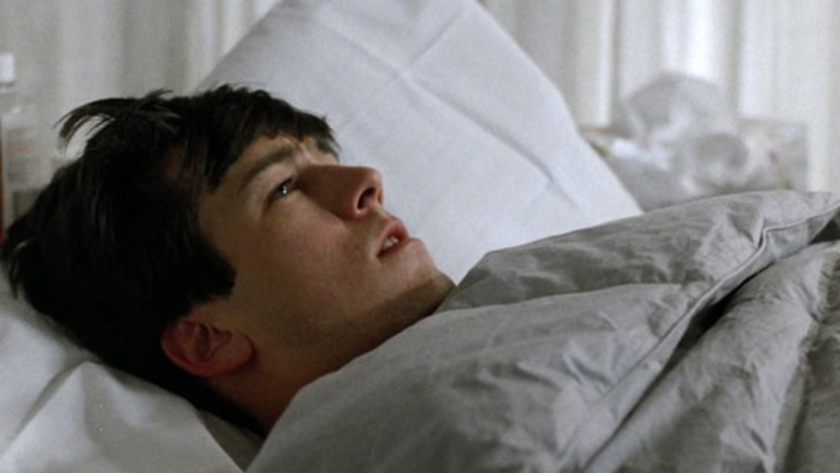In response to the COVID-19 outbreak, governments all over the world – including the UK – have urged those who can to stay at home. This newfound plethora of time may feel stressful and strange, or perhaps mind-numbingly boring. What better way to alleviate lockdown blues than by watching a great film, or finally tackling the tv show you’ve had on your watchlist for ages? Below, a handful of our writers share what films and television shows they’ve been watching to pass the time.

Sex and the City
Tomi Haffety
The perfect binge, watch-whilst-you’re-eating, feel-good series, Sex and the City is a noughties classic. Spanning ninety-four episodes over six years, the witty and glamourous series follows the lives of four women as they navigate style, sex and, quite obviously, the city. Carrie Bradshaw’s namesake column in a small New York newspaper is the backbone to the show as she narrates her and her best friends’ lives, inventing a wealth of creative euphemisms as the group’s relationships go out of fashion quicker than nineties sequins. Winning seven Emmy Awards out of a substantial fifty nominations, Sex and the City was an unprecedented hit when it first aired and is still just as relatable and entertaining. Although the crucial theme of spending absurd amounts of money on shoes and labels feels somewhat outdated – a detail toned down in the subsequent films – the show pioneered the normalcy of casual dating and cherished female friendships. As with many series from the same era, the show’s punchlines occasionally drew on casual racism and sexism, revealing the lengths the show still had to go. Nonetheless, it is a sitcom best watched when you want to fantasize about living in a big city, laugh at Samantha Jones’ consistent sexual humour, and realise, as popularly regarded, that Carrie Bradshaw is possibly the worst friend to grace television. More than this, the show’s unashamed approach to important issues regarding female sexuality and debates surrounding feminism continues to be relevant. Sex and the City remains a turning point in representing the modern woman, and its lasting legacy has filtered through generations; take, for example, the Instagram page ‘@everyoutfitonsatc,’ which has reached 670k people twenty years after the show aired. Watching Sex and the City will make you laugh, equip you with fashion tips, and – most importantly – help you pass the endless hours of quarantine.

Before Sunset
Sang Park
Whenever the going gets tough, at least one person will tell you to just focus on the positives, look forward, and crack on until things work out. However, it would be criminal for any of us to claim that the question of “what if?” has never crossed our mind. In Before Sunset, set nine years after Jesse and Céline’s first encounter in Vienna, we are re-introduced to the pair, who have both been pondering that very same question since the last time they saw one another. Once the two reunite, this time in Paris, what ensues is a stroll through la ville de l’Amour accompanied by a conversation that bounces around from topic to topic like a pinball. While their ramblings and chitchats show us the beauty of people’s ability to reconnect in an instant, no amount of coffee at a chic Parisian cafe or a sarcastic back and forth about American optimism and French sullenness is able to prevent Jesse and Céline from asking the inevitable question: ‘Where would we be now if we had met again after our night?’ As the two grapple with this hypothetical, the facade that they have both put up fades away and ultimately unsheathes the caged hopeless romantics living inside them.
Amidst this pandemic, most of us, like Jesse and Celine, are forced to make peace with the fact that our relationships with our loved ones and our community have come to an abrupt halt, and that they may be lost forever. Maybe like Jesse, you wish you could just call that girl, who took up all the nooks and crannies in your brain or maybe, you just miss grabbing a cold pint with your mates. Whatever the case may be, Before Sunset has something for everyone wrapped up in the pain of solitude. Jesse and Celine’s encounters remind us that there is a future, where we can love and treasure one another unconditionally; their enduring love reminds us of the joy in the unknown ahead of us, no matter our past and present.

Climax
Sofía Kourous Vázquez
There are a lot of parallels between quarantine life and Gaspar Noé’s Climax. Much like the film’s protagonists, who find themselves stuck in their dance school during a snowstorm in the middle of nowhere, we are all trapped indoors in what is also somewhat of a nightmare. Quarantine brings out the worst in everyone: you’ve got your sad babies who would rather curl up in a ball until it all blows over; your angry types who are just looking for someone to blame; and your run-of-the-mill thirsty hoes keeping their eyes on the prize through the chaos. If you need a reason to reminisce over your long-lost days of (possibly) substance-induced clubbing and then take it all back as Noé’s neon dance fantasy degenerates into depravity and horrific mayhem, Climax is your ticket. A global pandemic is a total bummer but hey, at least you’re not stuck unknowingly drinking large doses of LSD-spiked sangria with a bunch of fucked up French people! Explosive and immersive. Many trigger warnings apply.

My So-Called Life
Fatima Jafar
I watched all nineteen episodes of My So-Called Life in rapid succession one summer a few years ago, when there was a lot of time to do nothing. Something about the story of Angela Chase, a fifteen-year-old living in a quiet suburb of Pittsburgh, rang true for me then, and has stayed close to me all this time. Now, in these weeks of quarantine and isolation, when cities have slowed down and the roads seem quieter than ever before, I find myself turning to these episodes for some kind of solace. My So-Called Life expertly charts the lives of a few adolescents and their families in the fictional neighbourhood of Three Rivers. Each episode navigates the fabric of each character’s experiences with a tenderness that I have seldom seen in American coming-of-age television shows. The uncomfortable intricacies of growing up are delved into, and families, relationships, and health are picked apart and tackled with an unflinching eye. I think the reason that my mind goes back to this television show during the pandemic is because of its own willingness to sit in its slowness. The plotlines unfold with both the hesitancy and intensity that accompanies every confused teenager— the fleeting, intense crushes, the hot bursts of anger, the frequent tears. Because the heart of the show is the emotional drama between various characters, the story simmers within its own anxiety, and at times, it’s own yearning. This suburban pull – the desire to feel and experience something more than boring high-school life in a small neighbourhood – evokes a tension not far from the isolation we are experiencing right now. Watching human lives slowly playing out on screen and immersing myself in the tender fragility of passing time has helped me reframe this period of isolation for myself, teaching me how to pause and be on my own for a while.

Rocknrolla
Maria Düster
This film, I’ll admit, is a wildcard. I think about Guy Ritchie a lot – not because I admire him in any way, but because his films occupy such a niche place in the film industry that none of us knows exactly what to do with. While some may simply call them “British gangster films,” I prefer “pathological commitment to imbuing every single storyline on earth – from Sherlock Holmes to King Arthur to whatever the hell The Gentlemen was – with a mildly revolting form of British maleness that roots itself in Cockney accents, martial arts, and a simultaneous hatred towards and fetish for the class system.” All of his films – save for Aladdin, thank God – appear to be colour-graded with the hard salt spray of an ugly British beach somewhere. Yet, I still find myself drawn to his films, unable to look away (except for the half of them I have never seen). Rocknrolla follows a trio of crooks called “The Wild Bunch,” comprised of “One-Two” (Gerard Butler), his partner “Mumbles” (Idris Elba), and driver “Handsome Bob” (Tom Hardy). When a (you guessed it) Russian mob boss concocts a massive real estate scam, The Wild Bunch – along with a crime boss (Tom Wilkinson), an evil accountant (Thandie Newton), and a punk rocker named Johnny Quid (Toby Kebbell) – all duel it out for a big wad of cash. Mark Strong’s alluring narration, combined with a convoluted and unrealistic plot, provide the perfect escapism for surviving a raging pandemic. Also, unless I imagined it in a fever dream, Tom Hardy hooks up with Gerard Butler in one scene. Or maybe it was Idris Elba? Either way, happy watching!
Ferris Bueller’s Day Off

Niloufar Javadi
I grew up consuming an unhealthy amount of American media. Ferris Bueller’s Day Off was one of those films that I had heard about countless times, but never actively sought out. So when my American flatmate suggested watching it, I tentatively agreed. I was pleasantly surprised. Ferris Bueller’s Day Off follows wisecracking high school senior Ferris Bueller (Matthew Broderick), who is determined to enjoy a day off school sightseeing in Downtown Chicago with his girlfriend Sloane (Mia Sara) and his best friend Cameron (Alan Ruck). Equipped with a charming protagonist, fast-paced plot, and surprisingly deep and tender moments, the film offers a welcome distraction from the sporadic episodes of uncertainty and confusion that seem inseparable from our new reality. Like most people I know, I have become increasingly introspective during the lockdown (I like to think I have good reason to). Like Ferris, I am about to graduate and be hurled into the “real world,” where I will need to survive without an academic structure for the first time since I was four years old. The past month has forced me to put my life on hold, to think about the direction I am taking the rest of my adult life and why. Ferris Bueller offers a reassuring squeeze of the hand, reminding me that there is no harm (well, perhaps not too much) in taking a day off of normal life to think, indulge and live more deliberately.
COVID-19 is a global health emergency. UCL Film and Television Society urges all readers to consult their local government’s advice. For UK-specific advice, visit https://www.gov.uk/coronavirus.



